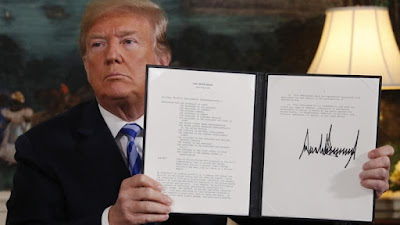by Nomad
Prior to President Trump's decision to pull out of the Iranian nuclear arms accord, polls showed that majority of Americans (63 percent) said the United States should not withdraw from the agreement.
According to the poll conducted by SSRS, an independent research company, 29 percent in the latest survey said the U.S. should exit, eight percent did not have an opinion.
Nearly half of those surveyed, 46 percent, said they disapprove of how the president is managing the nation’s relationship with Iran, while 37 percent said they approve. Seventeen percent said they did not have an opinion on the matter.
The president, surrounded by war-hawks like National Security Advisor John Bolton and Secretary of State Mike Pompeo, paid no attention to what Americans thought. Trump said:
"It is clear to me that we cannot prevent an Iranian nuclear bomb under the decaying and rotten structure of the current agreement.. The Iran deal is defective at its core. If we do nothing we know exactly what will happen."In a PBS interview, Ernest Moniz, former Energy Secretary and a key member of the American negotiating team, expressed his concerns about the consequences of Trump's decision.
I think it would be frankly tragic for a couple of reasons. One is it will take away the process that we need right now, in fact, to explore these the information in the Israeli information.
It will drive a wedge between the United States and our allies in Europe and it will be very, very messy because, on the one hand, the European governments, the UK, France, Germany have all made it clear while Iran is in compliance, we should be working with them to keep them in compliance.
At the same time, their own companies will be subject to sanctions from the United States.
Later, after Trump's decision was announced, Moniz expanded his remarks in a statement:
“President Trump’s decision today to withdraw from the Iranian nuclear deal is a major strategic mistake that not only damages the United States’ ability to prevent Iran from acquiring the material for a nuclear weapon, but also impairs our ability to prevent the spread and use of nuclear weapons, to work with allies and partners on issues of global concern and to protect our interests in the Middle East for years, if not decades, to come.According to Trump's logic, an unaudited Iran is somehow better than an Iran subject to inspections.
The Iran nuclear deal rolled back Iran’s nuclear program and imposed uniquely stringent monitoring and verification measures—the most important elements of which were permanent—to prevent the country from ever developing a bomb. The United States is now in violation of the terms of the deal without offering a credible alternative.As flawed as the agreement might have been, the 2015 arms agreement, at least, offered a framework to build upon. Verification is at the heart of the deal, and it’s working.
“The Iran deal is and has always been about depriving Iran of the nuclear materials—highly enriched uranium and plutonium—needed to make a weapon. As international inspectors, who have been on the ground every day since the deal was concluded, have confirmed: the Iran agreement has accomplished this.
Once again, Trump's arrogance has led him to dismiss the counsel of allies. Just as George W. Bush once did in the lead-up to the invasion of Iraq in 2003.
The fact that the advice of this nation’s most important allies was ignored in this decision adds to the consequence of the President's decision.
The agreement was very clearly in the U.S. national interest, Moniz says. It is, he added, hard to predict what will unfold from here. The President has driven a deep wedge between the United States and our allies in Europe.
In the wider perspective, Trump's decision plays right into the hands of Vladimir Putin who would like nothing better than to see more distrust in US leadership among its allies. Research by the Pew Research Center found that, even before this latest announcement, Trump's erratic statements on foreign policy, have raised serious doubts.
Respondents in US allies such as Japan, South Korea and seven European NATO members - Greece, Germany, Turkey, Hungary, France, Italy and Spain - which have historically relied on the US for military support and defense, all expressed more confidence in Putin.
That must be music to Putin's ears.

